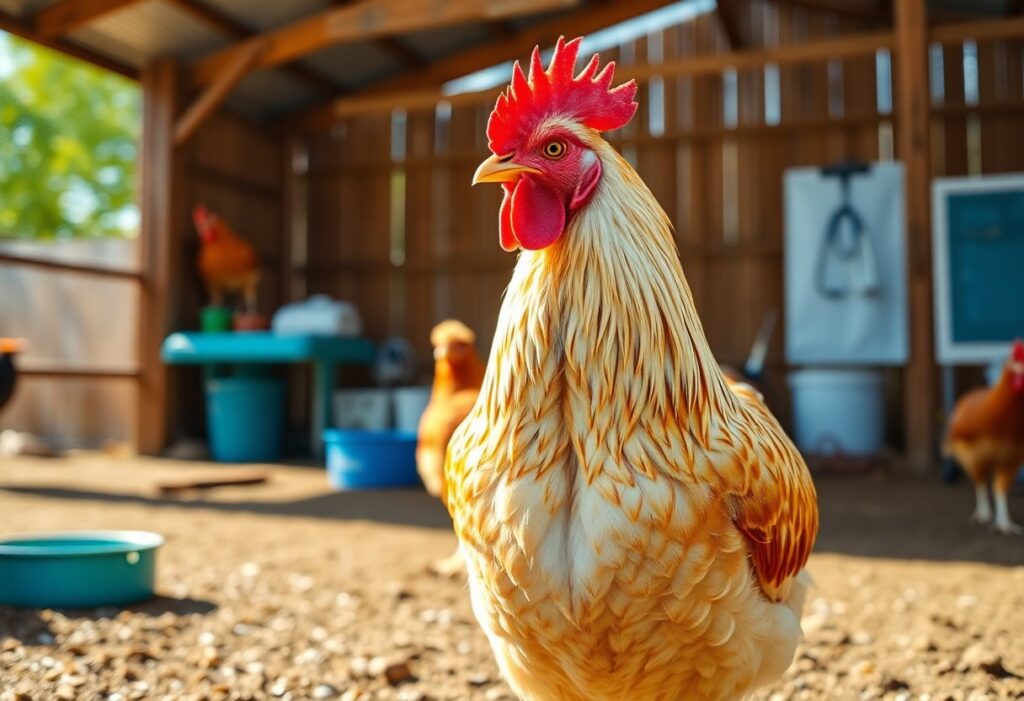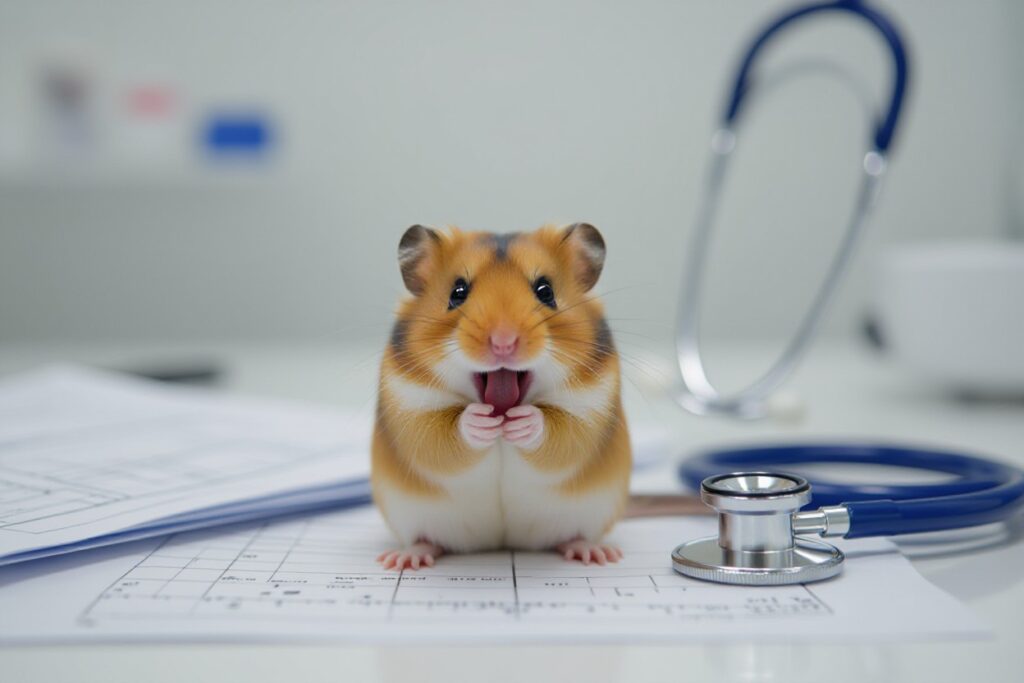This guide will help you identify common health issues that can affect your rooster and provide effective strategies to prevent them. Keeping your rooster healthy involves understanding signs of illness, ensuring proper nutrition, and maintaining a clean living environment. By being proactive, you can enhance your rooster’s well-being, prevent potential diseases, and enjoy a flourishing flock. Join us as we investigate into the specific health challenges roosters face and the best practices to ensure they lead a healthy, vibrant life.
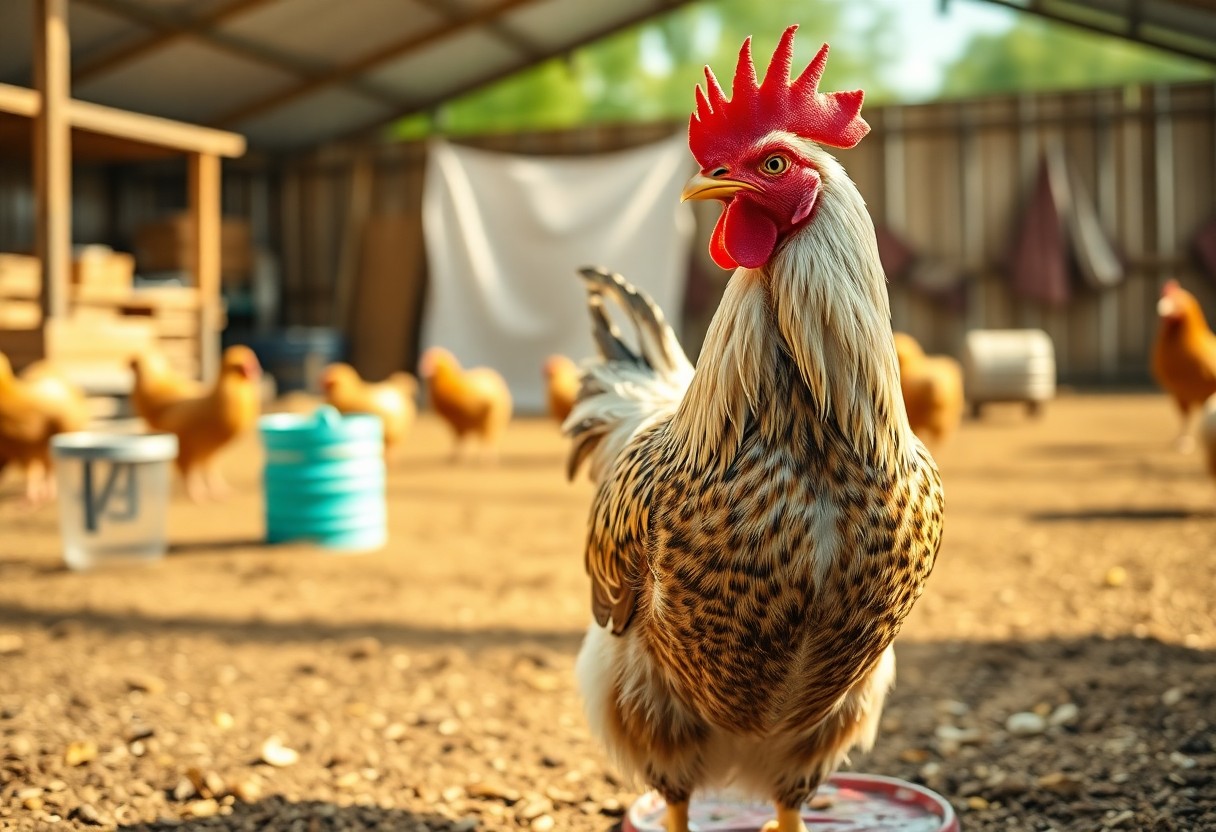
Key Takeaways:
- Regular health checks and monitoring for signs of illness can help detect issues early, allowing for timely intervention.
- A balanced diet, which includes adequate vitamins and minerals, plays a significant role in maintaining rooster health and preventing common problems.
- Ensuring proper living conditions, such as adequate space, clean bedding, and protection from extreme weather, can minimize stress and reduce health risks.
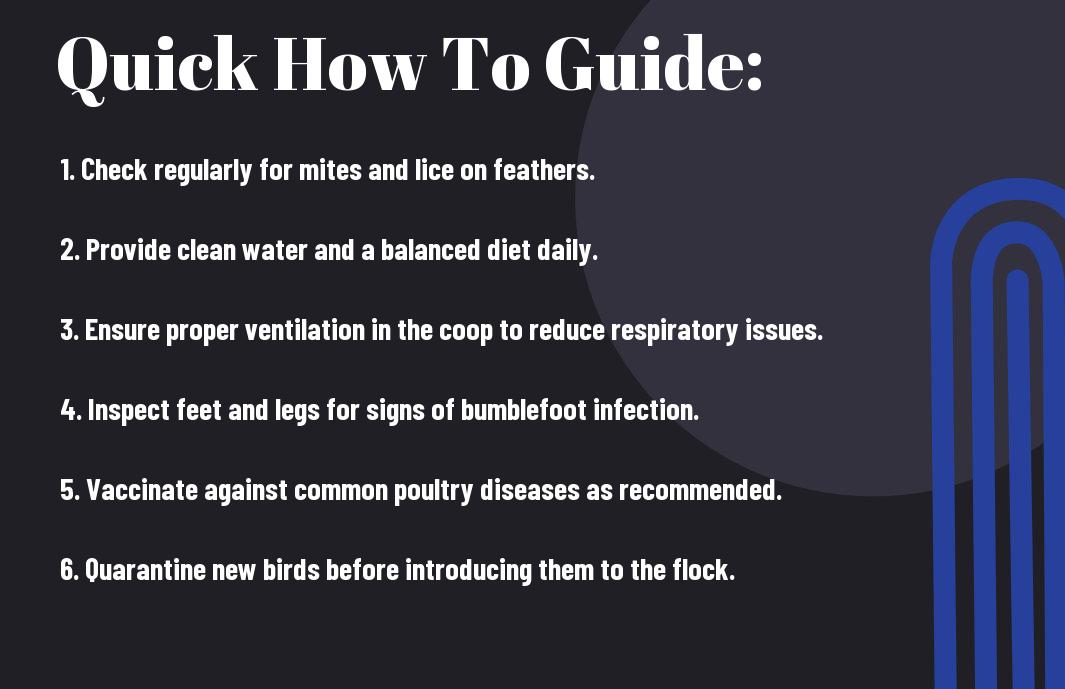
Understanding Common Rooster Health Issues
For effective poultry management, it’s necessary to recognize the common health issues that can affect your rooster. Roosters are vital to any flock, not just for reproduction but also for their protective and social roles. Understanding their health needs can help you provide a vibrant environment where your roosters thrive, ensuring the overall health of your entire flock.
Identifying Symptoms
Understanding the symptoms of health issues in roosters is necessary for early intervention. Look for signs such as lethargy, changes in appetite, or unusual behaviors. Additionally, pay close attention to their plumage; any signs of feather loss or discoloration can indicate underlying health problems. Being vigilant about these symptoms can help you address potential issues before they escalate.
Recognizing Causes
Any health problems in your roosters often stem from various factors, including poor nutrition, inadequate living conditions, or exposure to pathogens. It’s vital to provide your roosters with a balanced diet and a clean, safe environment to minimize these risks.
Common causes of health issues in roosters can be linked to factors such as nutritional deficiencies, poor hygiene, and stress from an overcrowded living space. Additionally, exposure to parasites and infectious diseases can significantly impact their health. To maintain robust roosters, ensure they have access to high-quality feed, clean drinking water, and a spacious, comfortable habitat that reduces stress. By proactively addressing these issues, you can promote better health and resilience in your roosters.
How to Prevent Common Health Issues
Some simple practices can help you maintain your rooster’s health and prevent common issues. Regular check-ups, a clean living environment, and a healthy diet are fundamental. Ensuring your flock has enough space to roam and socialize will promote well-being and reduce stress. You can also monitor their behavior for any signs of illness early on.
Tips for Daily Care
Daily interactions with your rooster can foster a strong bond and ensure you notice any potential health issues early. Here are a few important practices to consider:
- Provide clean water daily to prevent dehydration.
- Maintain a clean coop to reduce disease outbreaks.
- Observe their behavior for any changes that may indicate illness.
- Ensure adequate exercise to promote physical health.
Perceiving and understanding their behavior will help you address issues promptly.
Strategies for a Healthy Diet
Daily nutrition plays a significant role in your rooster’s overall health, impacting everything from feather quality to immunity against diseases. The foundation of a nutritious diet consists of a quality poultry feed, supplemented with fresh vegetables and fruits. Integrating grit aids in proper digestion, while providing calcium sources contributes to strong bone health. Avoid overindulging in treats that may lead to obesity. Understanding the right balance in your rooster’s diet can lead to a vibrant, healthy bird.
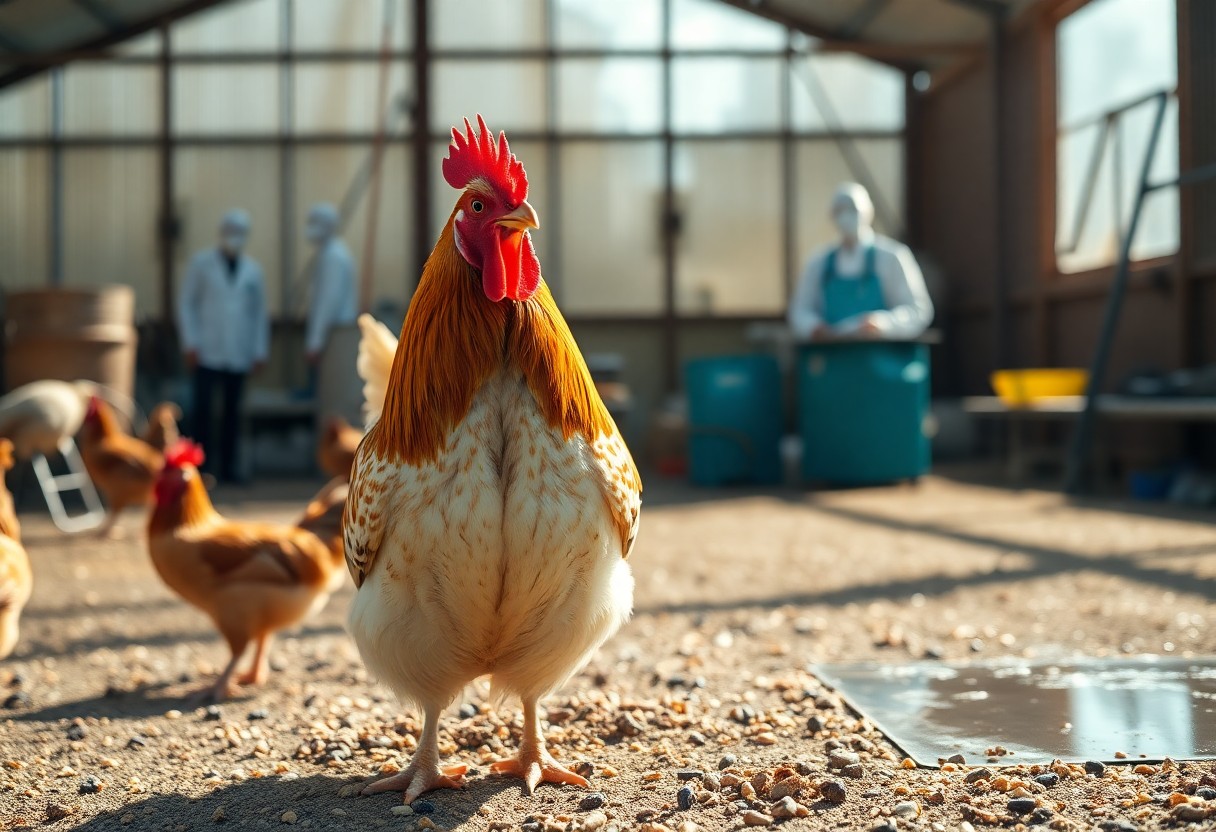
Factors Affecting Rooster Health
Once again, your rooster’s health can be influenced by various factors that require your attention.
- Genetics
- Nutrition
- Environment
- Social interactions
Assume that by understanding these elements, you can significantly enhance your rooster’s wellbeing.
Environmental Considerations
Factors such as temperature, humidity, and space play a vital role in your rooster’s overall health. Ensure your coop is well-ventilated and protected from extreme conditions. Providing sufficient room for movement is vital to prevent stress and health problems.
Social Interactions and Stress Management
While the social dynamics within your flock can impact your rooster’s health, it’s important to manage these interactions efficiently. Isolation from the group or overcrowded conditions can lead to heightened stress, aggression, and even health decline.
It is vital to foster a positive environment by maintaining a balanced flock size and observing the social structure among your roosters. Provide ample space to minimize territorial disputes and ensure each rooster has access to food and water. By encouraging healthy social interactions, you create a less stressful environment, leading to happier and healthier roosters.
How to Monitor Rooster Health
Now is the perfect time to establish a routine for monitoring your rooster’s health. Regular observation and proactive measures can help you catch potential issues before they escalate. By being attuned to your rooster’s behavior, appearance, and environment, you can ensure that he thrives and enjoys a long, healthy life.
Routine Check-Ups
Health check-ups are vital for maintaining your rooster’s well-being. Schedule regular visits with a veterinarian who specializes in poultry to assess his health. During these check-ups, ensure that vaccinations are up to date and any signs of parasites or diseases are promptly addressed. A proactive approach helps to catch issues early.
Signs of Illness to Watch For
With a keen eye for detail, you can identify early signs of illness in your rooster. Look for symptoms such as lethargy, changes in appetite, or abnormal droppings, as these can indicate underlying health problems. Furthermore, an increase in vocalization or any changes in feather condition may also signal distress.
Routine assessment of your rooster’s health can prevent serious complications. Pay attention to lethargy, which can indicate a serious issue, and always monitor for abnormal droppings that may signal digestive problems. Additionally, changes in appetite or vocalization should never be overlooked, as these are often early warning signs of illness. Being attentive to these details allows you to act swiftly, ensuring your rooster remains healthy and vibrant.
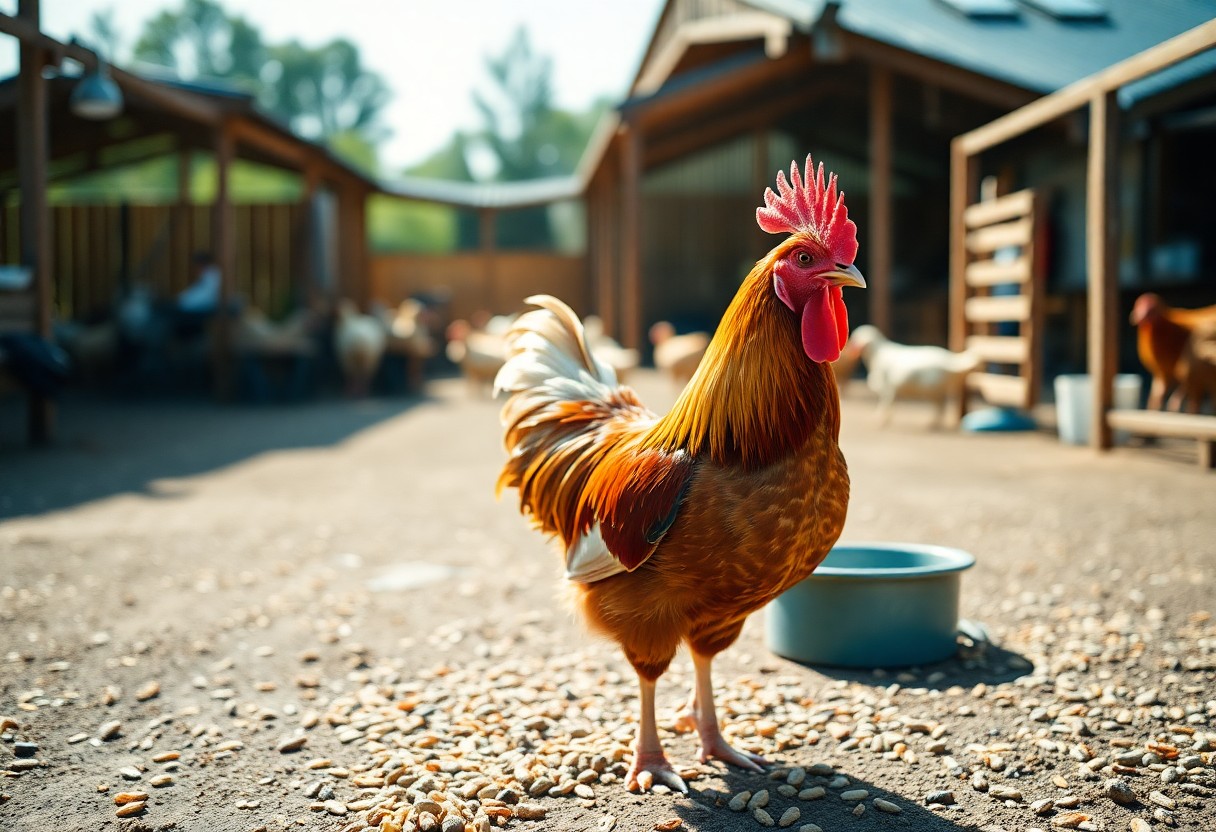
Tips for Vaccination and Disease Prevention
Despite the challenges faced in poultry health, proper vaccination and disease prevention methods can significantly mitigate risks. To keep your roosters healthy, consider these tips:
- Consult a veterinarian for a tailored vaccination plan
- Ensure a clean and sanitary living environment
- Monitor for signs of illness regularly
- Provide a balanced diet to strengthen immunity
Knowing these tips will empower you to maintain optimal health for your roosters.
Recommended Vaccines
An effective vaccination program for your roosters should include vaccines for Marek’s disease, Newcastle disease, and infectious bronchitis. Each of these vaccines plays a vital role in preventing serious ailments that could affect your flock’s overall health and productivity.
Schedule for Immunization
With a structured schedule, you can ensure your roosters receive their necessary vaccinations on time. Typically, vaccinations begin at a young age, around one day old, and continue into their adult years to provide ongoing protection.
Recommended vaccination schedules often involve administering the first doses of vaccines, such as Marek’s disease, at a very young age, with follow-ups occurring at intervals depending on the vaccine type. For instance, boosters for Newcastle disease may be given every six months. Regular monitoring and adhering to your vet’s guidelines ensures your roosters maintain a strong immune system against potentially dangerous diseases. Keeping an organized vaccination timetable is crucial for the wellbeing and longevity of your flock.
Preparing for Emergencies
Keep your roosters safe by preparing for emergencies that may arise. Regularly monitor their health and behavior, and equip yourself with the knowledge to handle potential health issues. Having a plan in place ensures you can respond swiftly to any incidents, protecting your flock from serious harm.
Creating a Health Plan
The first step in safeguarding your roosters is to create a comprehensive health plan. This should outline regular health check-ups, vaccinations, and dietary needs tailored to their age and breed. By establishing a structured plan, you can detect health issues early and maintain your roosters’ well-being effectively.
Assembling a First Aid Kit
Any responsible rooster owner should assemble a first aid kit stocked with crucial items to treat injuries and illnesses. This kit should include antiseptic wipes, bandages, gauze, tweezers, and other supplies that may come in handy.
To ensure you are prepared for any situation, your first aid kit should contain items such as antiseptic wipes for cleaning wounds, bandages and gauze for dressing cuts, and tweezers for removing splinters or foreign objects. Additionally, consider including vaccines and medical supplies recommended by your veterinarian. Regularly check your kit for expiration dates and update it as necessary, so you can provide immediate care when it counts the most.
Summing up
Considering all points, you should be aware of common rooster health issues such as respiratory infections, mites, and nutritional deficiencies. By implementing preventive measures like maintaining clean living conditions, providing a balanced diet, and conducting regular health checks, you can significantly reduce the risk of these ailments. Keeping a close watch on behavioral changes and ensuring timely veterinary care will further enhance your roosters’ well-being, ensuring they remain healthy and productive members of your flock.
FAQ
Q: What are some common health issues that roosters may face?
A: Roosters can experience a variety of health issues, including respiratory infections, parasitic infections, and bumblefoot. Respiratory infections can result from poor ventilation or exposure to damp conditions. Parasitic infections, such as mites and worms, can affect their overall health and behavior. Bumblefoot is a bacterial infection that occurs in the foot, often resulting from injuries or unsanitary living conditions.
Q: How can I prevent respiratory infections in my rooster?
A: To prevent respiratory infections, maintain good ventilation in the coop to ensure fresh air circulation. Regularly clean the coop to minimize dust, ammonia buildup, and dampness. Avoid overcrowding, as this can lead to increased stress and a higher risk of disease transmission. Additionally, consider providing good quality feed and clean water to support their immune system.
Q: What steps can I take to control parasites in my roosters?
A: To control parasites, regularly inspect your rooster for signs of infestation, such as feather loss or unusual scratching. Maintain a clean living environment by frequently cleaning the coop and replacing bedding. Use diatomaceous earth as a natural preventative against external parasites and consult with a veterinarian for appropriate deworming schedules and treatments if internal parasites are suspected.
